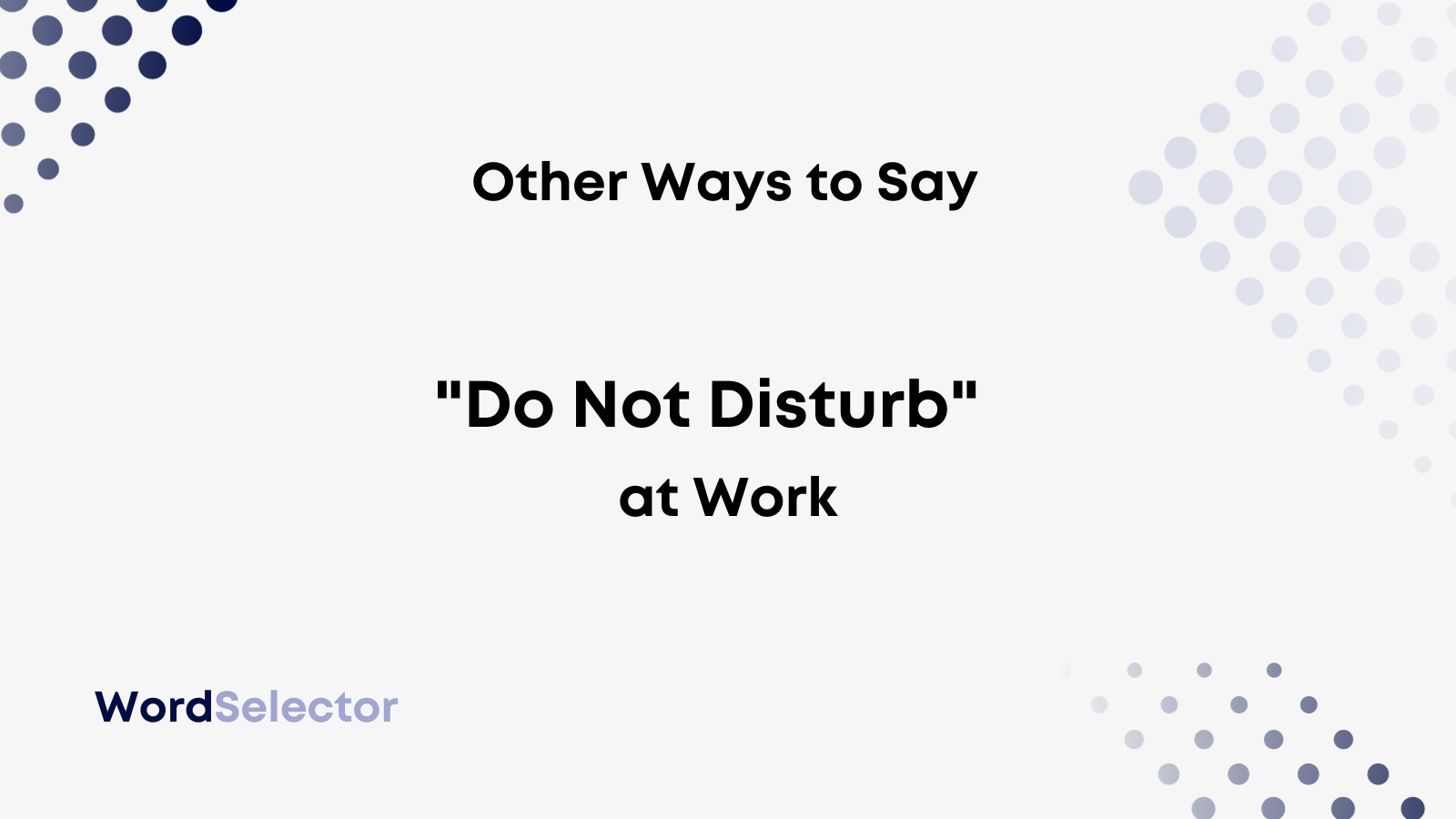Okay, so you’re busy and don’t want someone to disturb you at work.
Maybe you’re wondering if “do not disturb” is appropriate to use.
Well, if you think it’s a bit too forced or rude, you’ve come to the right place.
This article has gathered some alternatives showing you how to say “do not disturb” politely.
Other Ways to Say “Do Not Disturb”
- Please respect my privacy
- Sorry, but I’m too busy
- I’m currently in a focused work mode
- Please allow me time to concentrate
- I appreciate minimal interruptions during work
- Please refrain from disturbing me
- I’m in the midst of an important task
- I only ask for uninterrupted work time
- I would appreciate some quiet time
- Don’t take this the wrong way, but I need to be alone
- Please give me some space to sort this
- I just need a bit of time alone
KEY TAKEAWAYS
- “Do not disturb” is a simple yet effective way to show that you don’t want to be interrupted.
- “Please respect my privacy” is a great formal alternative showing that someone has to leave you in peace.
- “Sorry, but I’m too busy” is an informal synonym that shows you’d appreciate it if someone left you alone.
Keep reading to learn a nice way to say “do not disturb.” We’ve covered the best formal and informal phrases to help you say “do not disturb” without saying it directly.
You can also skip to the final section to learn if it’s rude to say “do not disturb.” We recommend reading through this part to see whether it’s appropriate to include it in your writing.
Please Respect My Privacy (Formal)
Feel free to use “please respect my privacy” instead of “do not disturb.”
It works well professionally, making it an excellent choice when you insist someone leaves you alone.
For instance, you can use it when asking an employee to leave you. It shows you’d prefer it if they didn’t take time out of your busy schedule to ask you questions.
Also, saying “respect my privacy” suggests you have important and confidential things to work on.
It usually implies that you’d prefer it if someone wasn’t nearby when you work on those things to ensure they don’t see things they’re not supposed to.
Here are some great examples to help you if you’re still unsure:
Please respect my privacy. I’m trying to get this work done, and I would rather you didn’t get in the way.
Look, please respect my privacy. I have a lot to get on with, and I’d appreciate it if you backed away.
Sorry, but I’m Too Busy (Informal)
You can also use “sorry, but I’m too busy” instead of “do not disturb.” However, this one works much better in more informal instances.
It’s much more personal than “do not disturb.” Including “I’m too busy” shows you don’t have the time to work around someone and would appreciate it if they left you alone.
For instance, you can use it when messaging colleagues. It lets them know that you aren’t able to speak with them or help them with any projects until you complete your own work.
We highly recommend using it as a polite and friendly alternative.
After all, starting any phrase with “sorry” is a great way to keep things genuine and respectful.
Also, review these examples if you still need help:
Oh, I’m sorry, but I’m too busy. I’d like to talk more, but you’ll have to bear with me while I work through this.
Sorry, but I’m too busy. Thanks for stopping by, but we’ll have to discuss this stuff much later in the week.
Is It Rude to Say “Do Not Disturb”?
It is not rude to say “do not disturb.” It is okay to say, and you shouldn’t be ashamed to ask for it when someone is distracting you from work.
For instance, usually you would say “do not disturb” when you have something important to get on with. It lets people know that you’d prefer it if they didn’t disturb you and ruin your flow.
We recommend using it when someone tries to interrupt you. If they don’t realize you’re busy, it’s a good way to let them know you simply do not have the time or energy to talk to them.
Also, to avoid sounding too rude, it’s best to let them know when you’ll be free for them again.
After all, “do not disturb” is very final. So, letting someone know you’ll be free again shortly for them to talk to you and distract you is perfectly fine.
Here are some examples showing you how to use it if you’re still unsure:
I’m so sorry, but please do not disturb me right now. I have so many things to get on with!
Please do not disturb us. This is a very important project, and we want to make sure we get it right.

